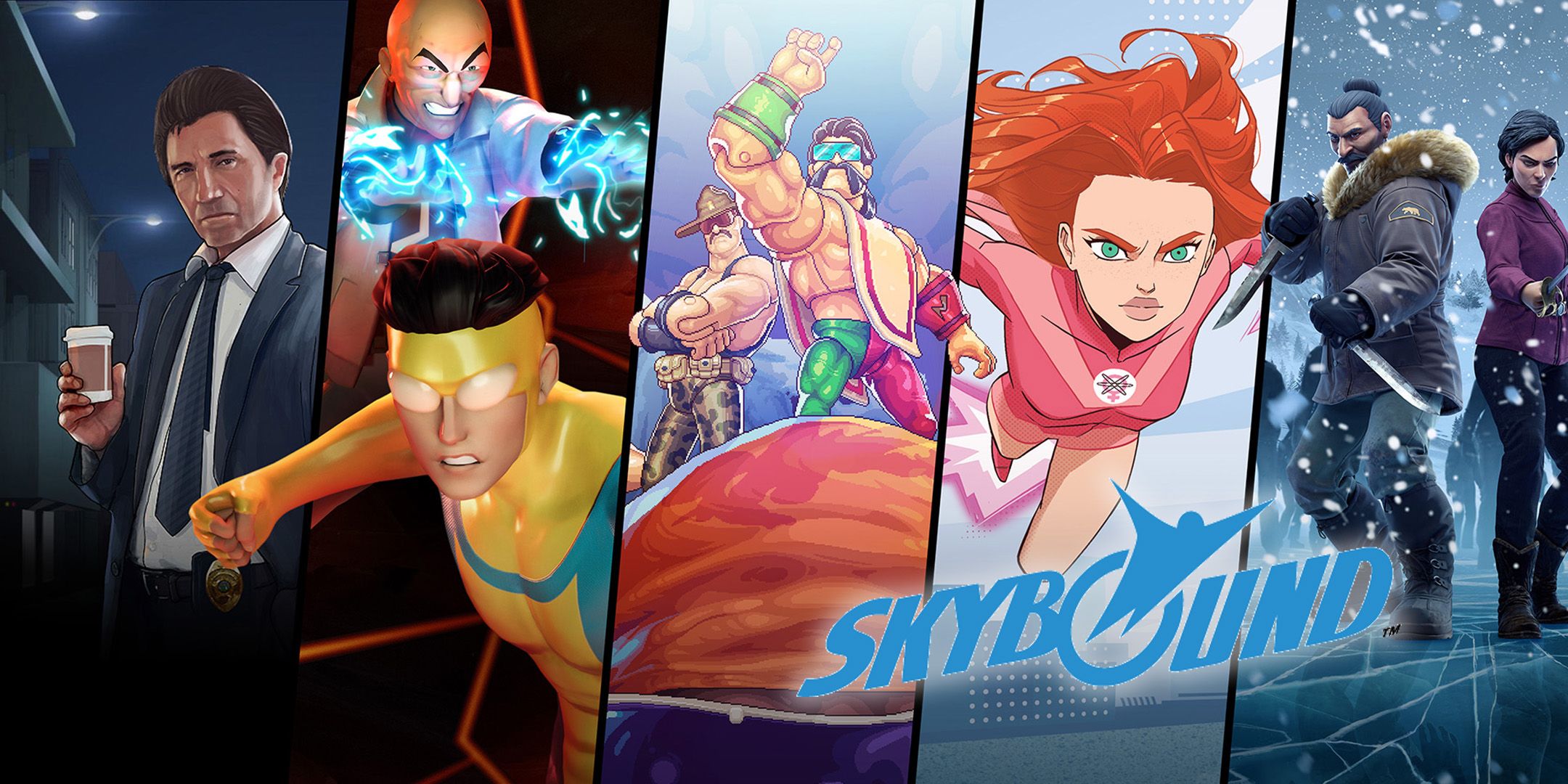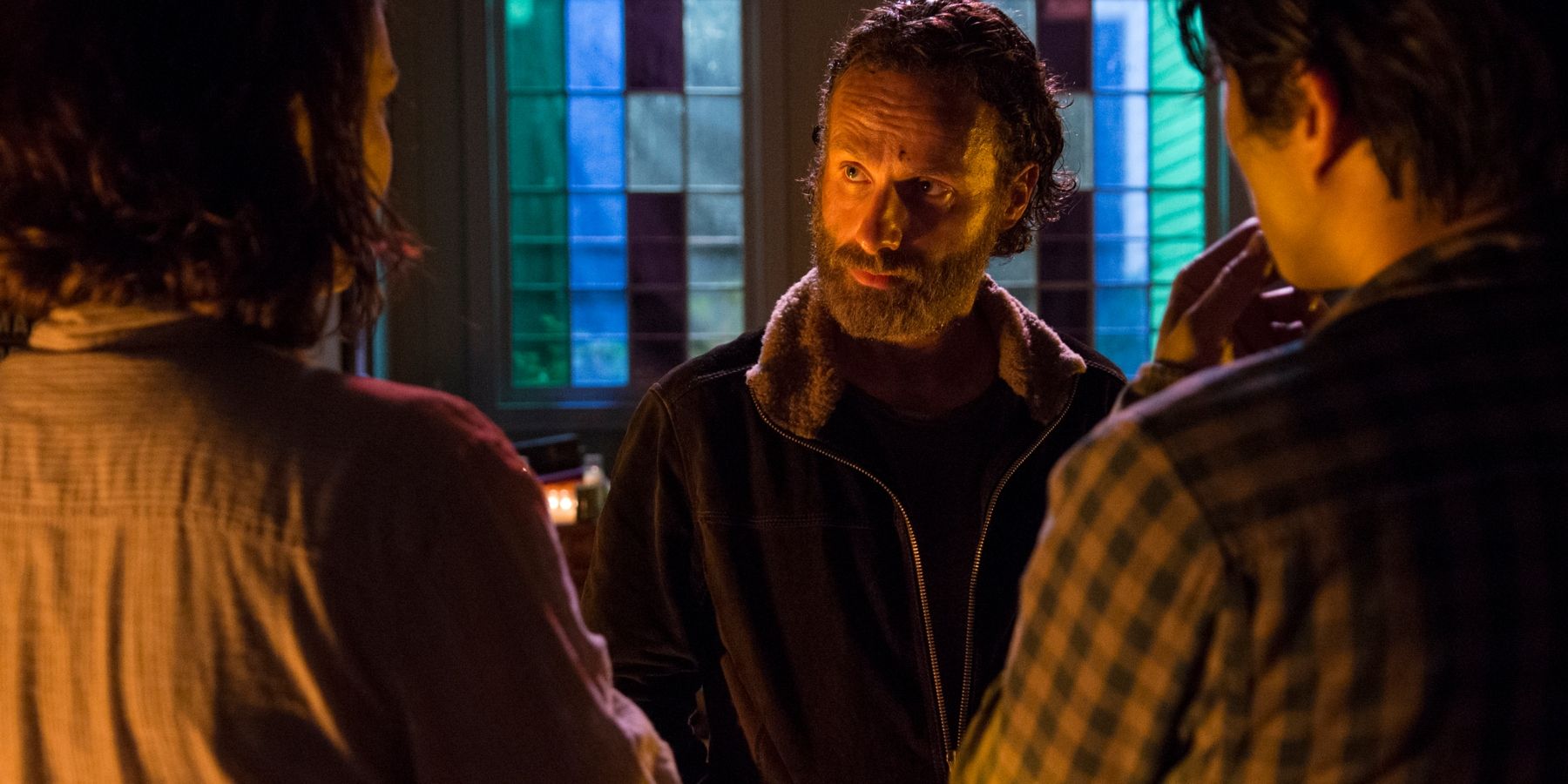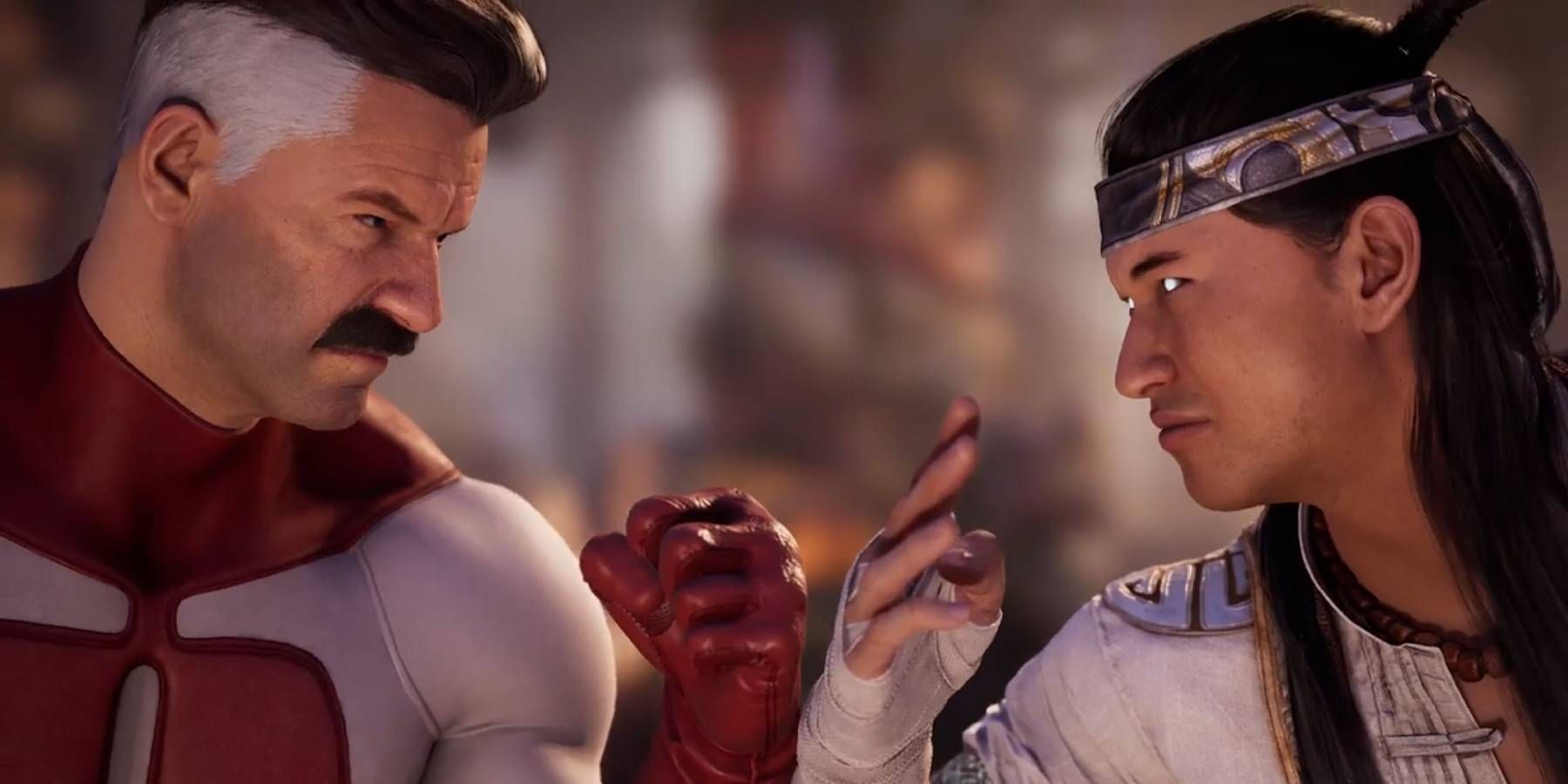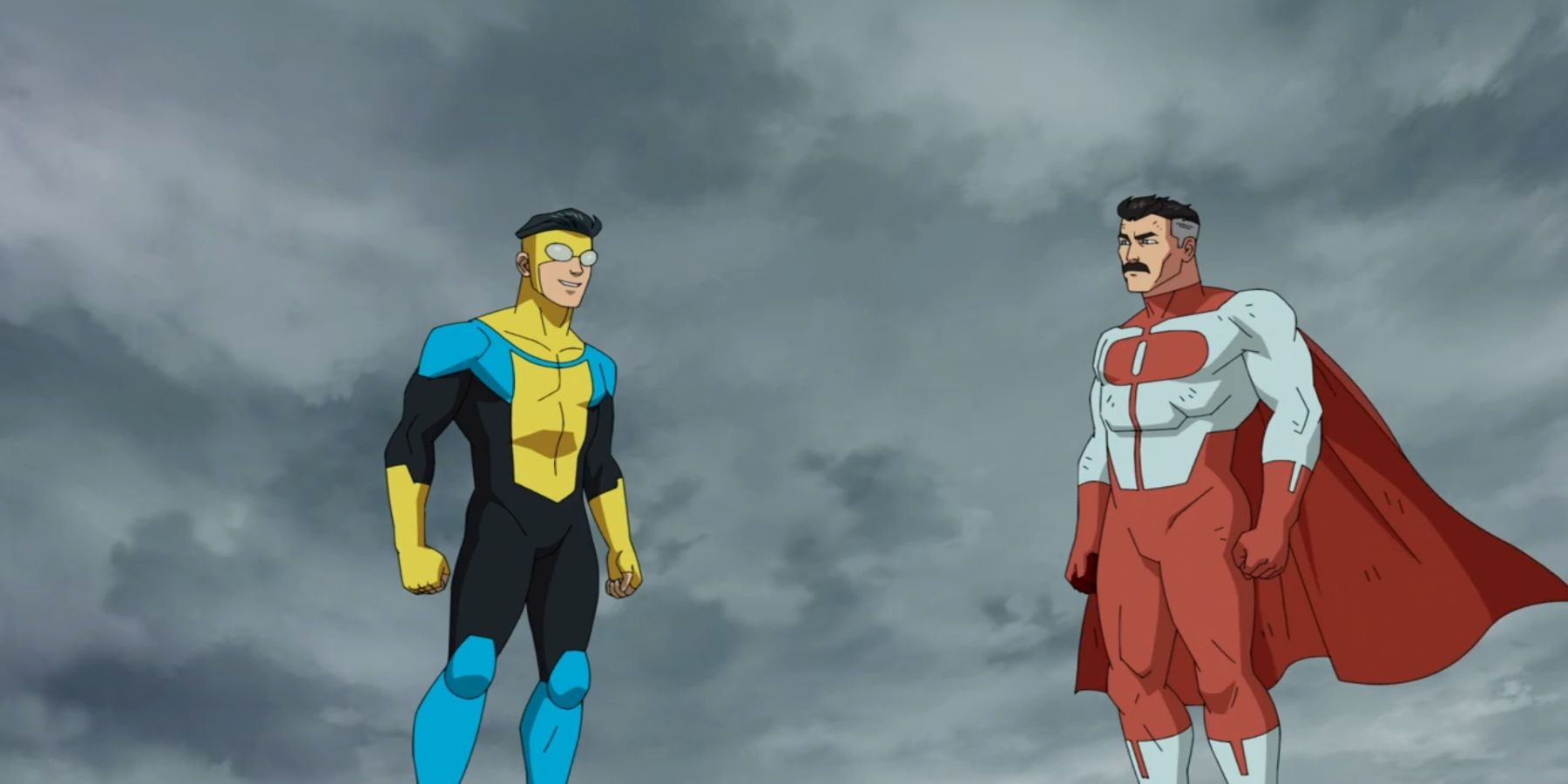
While The Walking Dead and Invincible feel like they have been around forever, the truth is they haven’t. The Walking Dead began in 2003 as a comic book series; it would later be adapted into video games, TV shows, and much, much more. Invincible also began in 2003, but its animated series adaptation on Amazon Prime didn’t come along until 2021. Behind both is Skybound Entertainment, the company responsible for each IP’s growth into different vectors outside the comic book space.
Skybound co-founder/CEO David Alpert and co-chairman/managing partner Jon Goldman spoke with Game Rant at Gamescom LATAM about expanding their IP into different entertainment mediums. They spoke about what makes the Brazil fan base so special, about the pervasiveness of gaming and entertainment culture, and offered advice to game makers looking to turn their IPS into multimedia universes. The following transcript has been edited for clarity and brevity.
Gamescom LATAM in Sao Paulo, Brazil
Q: Has anything special caught your eye about Gamescom LATAM during your time here?
Alpert: The main thing for us, as an American company, is finding great creators and creatives everywhere. Obviously there’s a lot in the US, but we’ve been working on our international expansion. We opened an office in Tokyo, we bought a company in France, and we bought a company in Iceland. We’re working on productions in Sweden, Spain, South Africa, Canada, and we were looking at Brazil. Brazil has an amazing talent pool of video game developers and video game creatives, but also in film, television, and comic books. We just feel like the amount of engagement and cultural confidence being created here in Brazil is just so high that we’re looking to find great creative partners down here.
Q: What about the creators and creatives here in Brazil really catches Skybound’s attention?
Alpert: Brazil has a massive population that’s growing super fast and consuming content as fast, so they’re really pop culture natives. They’re very fluent too. The fact that Brazil now has the largest comic convention in the world is one thing, but on the video game side, we’re seeing that they’re coming up the curve on the scale and quality of development at a rate and pace that we hadn’t seen in many places before. 10 years ago, the game development pool here was maybe not so deep. Now it’s incredibly deep, and the quality of content that’s coming out is really impressive.
Q: During your Gamescom panel you’ll be talking about this rise of gaming culture. What do you think sets gaming culture apart from other sources of entertainment?
Goldman: I think, from its very conception, it’s the fact that you’re part of the entertainment as players. One thing I’ve always said is you can go out with a partner, spouse, or whatever, you can go see a B movie and have a really good time even if the movie’s forgettable. If you are playing a racing game and the mechanics and physics aren’t good, if you turn the wheel and the car doesn’t turn, you’re pissed off. Not only is it a bad experience, but it makes you feel bad about yourself because you fail. We’re entertaining people in games in a much deeper way than other forms of entertainment, so you have to get it right in a different way, you have to get an A+ game all the time.
When it comes to gamers, if there’s a quality issue, they’ll let you know for sure.
They certainly will.

Q: When talking specifically about gaming culture, do you think are there any special responsibilities when you’re speaking to or representing gaming culture?
Alpert: I think one of the things beyond what Jon was saying about the quality issues is you actually spend more time in games than almost any other media, right? If you love a movie, if you watch that movie four times, you are really committed to that movie. That’s eight hours.
Goldman: Yeah, most people don’t do that.
Alpert: Yeah, most people watch a movie once if they watch it. Let’s say you watch a long-running TV show and you watch 30 episodes, that’s a big commitment, but that’s 30 hours of a TV show. You can play games for, and I have played games for, hundreds or thousands of hours.
The degree of commitment, the degree of emotional investment you can have in a world is off the charts. I think the culture reflects that. You said that they’ll let you know they don’t like something and that’s true, but they’ll let you know if they love something too. What you see is, I think, that people become incredibly protective of their game space, almost sometimes in conflict with the developer, because they’ll think like, “Hey, this is ours. I spent 80 hours here. I’m going to spend the next two or three months here. I’m protecting this like it’s my home.”
I think sometimes people view that passion in a negative way, but I actually think it’s a positive. It’s because people spend so much of their waking life playing games that they view it as the place where they live. People defend the places they live. That, to me, is one of the things you have to recognize about games and gaming culture that’s different. We spend more time here in a good game than in any other form of entertainment ever.
Goldman: I think that actually brings up a great opportunity to say how awesome Skybound is.
Alpert: I think that’s a great point.
Goldman: A lot of our peers in Hollywood and elsewhere do this hierarchy. You could think of their movies or TV shows at the top, and everything else is ancillary stuff that they try and make money off of. At Skybound, we think of everything as primary for the reason that David said.
They might spend more time in a game of The Walking Dead than they do watching any seasons of it or reading a comic, so for our fans who care about the universe, we can’t treat a game or something as an ancillary element. We can’t treat an action figure, a comic book, or anything else that way because we stopped defining ourselves as based on a product category or a distribution channel. We’re about serving fans who love a particular universe and helping creators bring their particular vision to life, so I think that’s one of the many ways we’re so awesome compared to other entertainment companies.


Using Skybound’s History of IP Expansion
Q: Accounting for all this – Brazil, gaming culture, these responsibilities- how does that apply to Skybound IP like The Walking Dead?
Alpert: The Walking Dead had great characters from the start, but it was a world, right? It has a rule set designed for a world where zombies exist. They don’t move fast, you kill them by shooting them in the head, they don’t talk, they can sense sound, and there is no cure. We’re not really going to talk about the origin. That rule set could basically be used as an RPG in a pen-and-paper game, right? And you can turn that into an RPG or strategy game.
It really opened itself up for gaming because it was as much about the Rick Grimes story as it was about these rules to tell your own story. That was one of the reasons ultimately Skybound came to be. We started with this rule set, and now, we are looking at expanding out. Brazil has been incredibly receptive to The Walking Dead, Invincible, all of our comic books, and all of our games. The Brazilian entertainment-consuming populous loves our stuff, and they’ve let us know. They’ve been perhaps the most vocal fan base that we’ve seen pretty much anywhere in the world.
When we see that, we’re like, “Okay, there’s something here, something is happening.” We see this rise of gaming culture here, this rise of comic book culture, and it’s at the point now where the intensity of that is really rivaling what’s going on in the US, which is surprising. For us, we see that and, of course, we have to be there and find a way to interact with that.
Q: And what about Invincible and what can you say about expanding your IP?
Alpert: Invincible was the top show for us here on Amazon Prime; it was the number one show on the service for a long time running. People loved seeing Invincible, and we’re looking at that and saying, “Hey, we’re bringing Invincible to games. We now have this free mobile game that we did in partnership with Ubisoft. We’ve had a couple of integrations with Fortnite, and we did an integration with Mortal Kombat.”
We’re seeing that response in gaming culture, too. It’s not that Invincible is just a comic culture, and it’s not just animation or TV culture. This is entertainment culture, and gaming and gamers embrace Invincible in a natural way. It’s the same thing as The Walking Dead, right? You have a massive character list, huge backstories, and great opportunities for fighting, for blood, and for extreme violence. It’s a natural for what people want in video games.
Q: I’ve seen a lot of smaller games trying to build these expansive universes as well. Would you have any sort of advice for them?
Alpert: The thing for me is you can’t make them love you, right? You can’t make the world love you. You have to find something that resonates organically and naturally. In a world of AI and our world of marketing budgets, it could really be anything, but if something comes out and doesn’t organically resonate with somebody in some way, there’s nothing you can do at that point. You’re dead.
Goldman: I’ve got a specific piece of advice here because I’ve thought about it a lot. I was a large, independent developer for a long time, and you can’t make the universe happen. The fans tell you when you have a hit. If you’re a small, independent game maker, the most important thing is to focus on making a great game and worry about the mechanics, the physics, and the fun in the game. Then, the fans will tell you if you’ve made the next game like Rocket League or whatever it is. You can’t do it in a PowerPoint in your office. David has a lot of stories about The Walking Dead. I don’t think there was an expectation going into The Walking Dead that we were going to make something that’s a 20+ year franchise. You start with a creative product that resonates.
Yeah, totally, and you can’t force something to resonate.
Alpert: Exactly. People will have an allergic reaction to it.
I don’t think gamers really like being told, “Hey this is the next big thing.”
Goldman: Yeah, there’s also an allocation of time here. I know a lot of people will spend a lot of time on their franchise Bible, planning their multimedia future, or whatnot, but that is time you’re not spending on the game. If you’re starting a game and the game isn’t awesome, there will be no universe that follows.


Q: We’ve talked about expanding IP and not just being games. Universes, movies and games, this whole thing. But back in the PS2 and DS days, there were a lot of video games tied to movies that were not great. In this space, when you’re talking about not limiting IP to a singular entertainment medium, what’s the difference between then and now?
Alpert: I think the difference now, and this is one of the basic tenets of why we founded Skybound, is that it’s possible to have a cohesive universe in one place, right? Growing up, I imagine it was the same for you. If you were into a comic book, you had to go to the store and buy a comic book, then go home and read it. If there was a TV show, you could turn on the TV and watch it, but if you wanted a video game, you had to get in the vehicle again, go to a different story, get that, and then bring it home. I look at the way that people consume content now, and it’s all right here on your phone or your device, right?
Now, you can literally go from reading a comic to interacting with a fan base and be like, “Hey, what’s going on here?” You can be playing a video game or listening to a podcast, instantly. You can be watching a show, and the whole time you’re discussing with your friends what you love about it, what you’d do differently, what you think sucks, right? All that stuff is happening in real time now, and you can go back and forth.
When I introduce a new IP to my kids, they’re like, “Okay, that’s a great show. Where’s the game?” They assume that it’s all a touch away. I’m not just saying this because they’re my kids, but they’re annoyed and frustrated when they can’t instantly delve deeper into a world. I think that’s going to become more of the de facto state of being because our time is so precious. If you want to spend 80 hours in this world, if you’re ready and willing to make this commitment, you want to dive right in, but if it’s not ready at that moment, you might forget that attachment and move on to something else you enjoy.
That’s what’s different for us. We grew up in a time of scarcity, three networks, and whatever you could buy at the game store. On Steam, 13,000 games came out last year. If one doesn’t catch your attention, the other one will, so there’s a chance to really build that relationship with a fan and engage with them. That’s the difference.
Goldman: I’ll tell you a big difference because I was making those games in that era. They were called synergy games, and it was just packaged software in boxes. When movies were coming out, the publisher didn’t actually care about their quality because you just needed to get a box in the store by the time the movie came out. People were too lazy to get the return, even if there was a money-back guarantee. With these live-operating games like what David is talking about, you can’t fool the customer. They’ll test it out and decide whether or not to play it, whereas back in the day, you were just shoving stuff into stores and making money as quickly as you could. If you missed day and date with the movie, you ruined your business, so quality was not necessarily the first filter that you cared about if you were working on these games back then.





